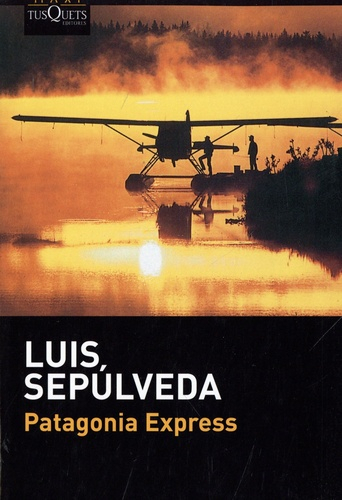
Patagonia Express
Pues bien, esta vez Sepúlveda nos invita a acompañarle, codo con codo, en algunos de sus periplos por las solitarias tierras de Patagonia y Tierra del Fuego. Así, conocemos a Ladislao Eznaola, vagabundo del mar en busca de un nave fantasma, a su hermano Agustín, el bardo de Patagonia, a Jorge Díaz y La voz de Patagonia de Radio Ventisquero, la ternura de Panchito y su delfín, a [...]
[lire le résumé du livre]
Auteur : Luis SEPULVEDA
Editeur : Tusquets Editores
Date parution : 02/2011CB Google/Apple Pay, Chèque, Virement
Quel est le sujet du livre "Patagonia Express"
Pues bien, esta vez Sepúlveda nos invita a acompañarle, codo con codo, en algunos de sus periplos por las solitarias tierras de Patagonia y Tierra del Fuego. Así, conocemos a Ladislao Eznaola, vagabundo del mar en busca de un nave fantasma, a su hermano Agustín, el bardo de Patagonia, a Jorge Díaz y La voz de Patagonia de Radio Ventisquero, la ternura de Panchito y su delfín, a aviadores enloquecidos que lo transportan todo, desde vino hasta muertos, por encima de la desolada inmensidad del paisaje... El libro se abre y se cierra con dos encuentros extraordinarios del autor con Bruce Chatwin y con Francisco Coloane, escritor chileno que alimentó la imaginación inquieta del niño Sepúlveda.
Apuntes de viajes, sí, pero también un aprendizaje de cómo viajar, de cómo conocer el mundo, de cómo mirarlo y quererlo. Luis Sepúlveda prolonga en cierto modo la tradición aprendida por él en los libros de su maestro Coloane y procura contagiarnos la inmensa felicidad de la verdera aventura. No en vano termina Patagonia Express con las siguientes palabras:
«Nunca más estaría solo. Coloane me había traspasado sus fantasmas, sus personajes, los indios y emigrantes de todas las latitudes que habitan La Patagonia y la Tierra del Fuego, sus marinos y sus vagabundos del mar. Todos ellos van conmigo y me permiten decir en voz alta que vivir es un magnífico ejercicio».
Luis Sepúlveda was a Chilean writer, film director, journalist and political activist.
He studied theatre production at the National University. In 1969, Sepúlveda was given a five-year scholarship to continue his drama studies at the Moscow University, but it was withdrawn after five months on account of 'misconduct' (he attended a party with a Politburo Officer's Wife, which was considered high ofense).
Luis Sepúlveda was politically active first as a leader of the student movement and in the Salvador Allende administration in the department of cultural affairs where he was in charge of a series of cheap editions of classics for the general public. He also acted as a mediator between the government and Chilean companies.
After the Chilean coup of 1973 which brought to power General Augusto Pinochet he was jailed for two-and-a-half years and then obtained a conditional release through the efforts of the German branch of Amnesty International and was kept under house arrest.
He managed to escape and went underground for nearly a year. With the help of a friend who was head of the Alliance française in Valparaíso he set up a drama group that became the first cultural focus of resistance. He was rearrested and given a life sentence (later reduced to twenty-eight years) for treason and subversion.
The German section of Amnesty International intervened again and his prison sentence was commuted to eight years of exile, and in 1977 he left Chile to fly to Sweden where he was supposed to teach Spanish literature. At the first stopover in Buenos Aires he escaped and managed to enter Uruguay. Because the political situations in both Argentina and Uruguay were similar to those in his home country, Sepúlveda went to São Paulo in Brazil and then to Paraguay. He had to leave again because of the local regime and finally settled in Quito in Ecuador guest of his friend Jorge Enrique Adoum. He directed the Alliance Française theatre, founded a theatrical company and took part in a UNESCO expedition to assess the impact of colonization on the Shuar Indians.
During the expedition he shared the life of the Shuars for seven months and came to an understanding of Latin America as a multicultural and multilingual continent where the Marxism-Leninism he was taught was not applicable to a rural population that was dependent on its surrounding natural environment. He worked in close contact with Indian organizations and drafted the first literacy teaching plan for the Imbabura peasants' federation, in the Andes.
In 1979 he joined the Simón Bolívar international brigade which was fighting in Nicaragua and after the victory of the revolution he started working as a journalist and one year later he left for Europe.
He went to Hamburg in Germany because of his admiration of German literature (he learned the language in prison) especially the romantics as Novalis and Friedrich Hölderlin and worked there as journalist traveling widely in Latin America and Africa.
In 1982 he came in contact with Greenpeace and worked until 1987 as a crewmember on one of their ships. He later acted as co-ordinator between various branches of the organization.
